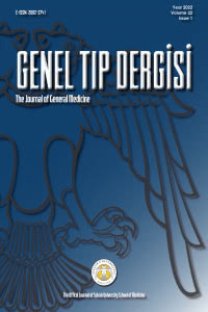Lenfomalı bir hastada postoperatif gelişen Staphylococcus aureus menenjiti
Amaç: Staphylococcus aureus menenjitin yaygın olmayan bir sebebi olup, primer olarak geçirilmiş nöroşirürjikel girişim veya travma gibi santral sinir sistemine ait altta yatan hastalığı olanlarda görülür. İntravenöz ilaç bağımlılığı, diabetes mellitus, hemodiyaliz gerektiren kronik renal yetmezlik ve maligniteler predispozisyon yaratan durumlardır. Bu makalede lenfomalı bir hastada operasyon sonrası gelişen Staphylococcus aureus menenjit olgusunun tartışılması amaçlanmıştır. Olgu sunumu: Lenfomalı bir hastada operasyon sonrası gelişen Staphylococcus aureus olgusu sunuldu. Bu durumun epidemiyolojik, mikrobiyolojik ve klinik bulguları ve tedavisi tartışıldı. Sonuç: Mortalite oranı yüksek olan stafilokokal menenjitte seçilecek ilaç önemlidir. Özellikle yakın zamanda santral sinir sistemine ait operasyon geçirmiş hastalarda, altta yatan predispozan bir durum da varsa menenjit etkeni olarak Staphylococcus aureus düşünülmeli ve tedavide bu etkene yönelik antimikrobiyal ilk seçenek olmalıdır.
Anahtar Kelimeler:
Menenjit, bakteriyel, Lenfom, Ameliyat sonrası komplikasyonlar, Staphylococcus aureus
Postoperative Staphylococcus aureus meningitis developed in a patient with lymphoma
Objective: Staphylococcus aureus is a relatively uncommon cause of meningitis, occurring primarily in patients with known preexisting abnormalities of the central nervous system (including the patients who have undergone previous neurosurgery or trauma). Predisposing underlying conditions include intravenous drug abuse, diabetes mellitus, chronic renal failure requiring hemodialysis and malignancies. In this article discussion of postoperative Staphylococcus aureus meningitis developed in a patient with lymphoma was aimed. Case report: A case was reported of postoperative Staphylococus aureus meningitis in a patient with lymphoma. The epidemiology, microbiological and clinical findings and treatment of this condition were discussed. Conclusion: The mortality rate of staphylococcal meningitis is rather high and because of this reason the drugs that will be chosen for therapy are very important. Specially in the patients who have undergone neurosurgical intervention and have predisposing factors, Staphylococcus aureus must be thought as a causative agent for meningitis and the antimicrobial drug that is effective to this agent must be the first choice for therapy.
Keywords:
Meningitis, Bacterial, Lymphoma, Postoperative Complications, Staphylococcus aureus,
___
- 1. Jensen AG, Espersen F, Skinhoj P, Rosdahl VT, Frimodt-Moller N. Staphylococcus aureus meningitis. A review of 104 nationwide, consecutive cases. Arch Intern Med 1993;23:1902-8.
- 2. Tunkel AR, Michael Scheld W. Acute meningitis. In: Mandell GL, Bennett JE, Dolin R, editors. Principles and Practice of Infectious Diseases. 5th ed. New York: Churchill-Livingstone; 2001. p. 959-97.
- 3. Givner LB, Kaplan SL. Meningitis due to Staphylococcus aureus in children. Clin Infect Dis 1993;16:766-71.
- 4. Falco Ferrer V, Almirante Gragera B, Pahissa Berga A, Gasser I, Fernandez Perez F, Martinez Vazquez JM. Meningitis caused by Staphylococcus aureus. Analysis of 16 cases. Med Clin (Barc) 1990;17;94:208-11.
- 5. Kim JH, van der Horst C, Mulrow CD, Corey GR. Staphylococcus aureus meningitis: Review of 28 cases. Rev Infect Dis 1989;11:698-706.
- 6. Parker SL, Conn KS, Ignotus PI. Staphylococcus aureus meningitis-a rare complication of iliacus muscle abscess. J Infect 1997;35:92-4.
- 7. Rathore MH, Barton LL, Silberstein MJ, Maton MC. Iliacus abscess in a child. Clin Pediatr 1990;29:710-2.
- ISSN: 2602-3741
- Yayın Aralığı: Yılda 6 Sayı
- Başlangıç: 1997
- Yayıncı: SELÇUK ÜNİVERSİTESİ > TIP FAKÜLTESİ
Sayıdaki Diğer Makaleler
Mehmet ERİKOĞLU, Öznur KÖYLÜ, Ertan BEYATLI, MUSTAFA ŞAHİN
Akciğer kanserli hastalarda radyoterapinin hematolojik parametreler üzerine etkisi
Ayşegül UĞUR, Gültekin YÜCEL, Fatma ATAMAN, Erdal KURTOĞLU, Elif TEKELİ
Lenfomalı bir hastada postoperatif gelişen Staphylococcus aureus menenjiti
Deneysel özofagus atrezisi modelinde özofagus ile trakea arası destek dokudaki farklılıklar
ENGİN GÜNEL, HASAN MADENCİ, MUSTAFA CİHAT AVUNDUK
Geçici iskemik atak ve akut istemik inmeli hastalarda hematolojik parametrelerin karşılaştırılması
AHMET AK, Akçay Ayşegül BAYIR, Mehmet GÜL, ABDULLAH SADIK GİRİŞGİN, SEDAT KOÇAK
